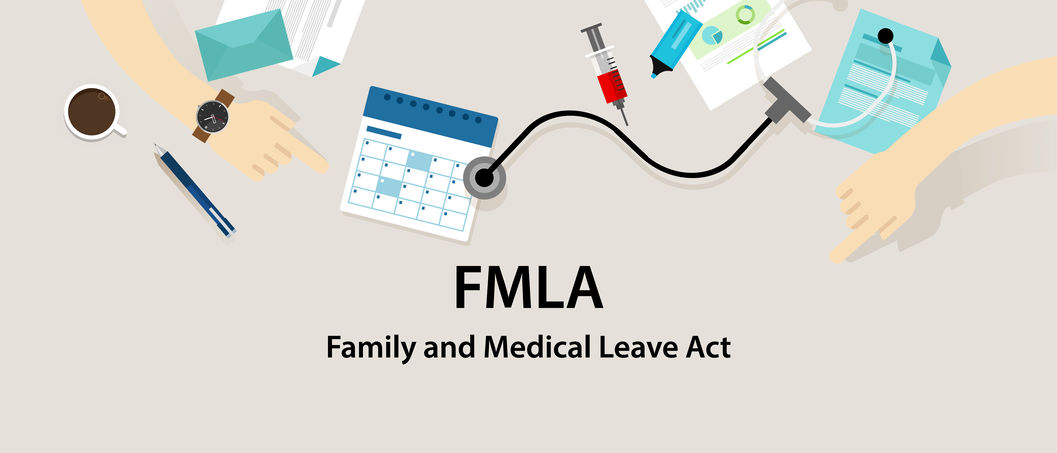On March 18, 2020, Congress passed the Families First Coronavirus Response Act (FFCRA). Among other things, the FFCRA provides free COVID-19 testing and establishes programs for children and veterans. Arguably, the two most important sections of the FFCRA for employers to be aware of are Divisions C and E which provide employees with paid sick leave during the coronavirus pandemic. The FFCRA applies to only businesses with less than 500 employees. Divisions C and E establish two new laws that will take effect April 2, 2020 and will remain in effect until December 31, 2020 – the Emergency Family and Medical Leave Expansion Act and the Emergency Paid Sick Leave Act.
Division C – Emergency Family and Medical Leave Expansion Act
The Emergency Family and Medical Leave Expansion Act expands the Family and Medical Leave Act of 1993. The expansion allows for up to 12 weeks of paid, protected leave for eligible employees who need to stay home due their child(ren)’s school or childcare facility being closed as a result of COVID-19. An eligible employee is one who has worked for the company for at least 30 days. Unlike the traditional FMLA regulations, which apply to businesses with 50 or more employees, this new expansion applies to all businesses with less than 500 employees.
The first 10 days for which an employee takes leave under Section C shall be unpaid leave. However, an employee may elect to use any accrued vacation or sick days during the first 10 days. After the initial 10 days, any remaining time taken by an employee must be paid by the employer. The Emergency Family and Medical Leave Expansion Act states that an employee is entitled to two-thirds of his or her normal wage for the number of hours he or she would be regularly scheduled to work during the week. If an employee’s schedule varies each week, the expansion provides for a way to calculate said employee’s payments. However, regardless of an employee’s salary, the expansion states that the maximum a payment can be is $200 per day and $10,000 in total.
When the period of leave is over, the employer must take reasonable steps to restore the employee to an equivalent position that he or she held prior to the leave.
Division E – Emergency Paid Sick Leave Act
Like the Emergency Family and Medical Leave Expansion Act, the Emergency Paid Sick Leave Act applies to employees who must leave work for coronavirus situations. The Act states that sick leave must be paid “to the extent the employee is unable to work or telework” because:
- The employee is subject to a Federal, State, or local quarantine or isolation order related to COVID–19.
- The employee has been advised by a health care provider to self-quarantine due to concerns related to COVID–19.
- The employee is experiencing symptoms of COVID–19 and seeking a medical diagnosis.
- The employee is caring for an individual who is subject to an order to quarantine.
- The employee is caring for a son or daughter of such employee if the school or place of care of the son or daughter has been closed, or the childcare provider of such son or daughter is unavailable, due to COVID–19 precautions.
- The employee is experiencing any other substantially similar condition specified by the Secretary of Health and Human Services in consultation with the Secretary of the Treasury and the Secretary of Labor.
The Emergency Paid Sick Leave Acts states that an employee shall be paid his or her normal wage for the amount of time as follows:
- Full-Time Employees: 80 hours
- Part-Time Employees: a number of hours equal to the number of hours that such employee works, on average, over a 2-week period
However, the FFCRA has placed caps on the amount of sick pay an employee is entitled to. Specifically, if an employee is out of work due to reasons 1, 2, or 3 (employee illness), as specified above, the paid sick time shall not exceed $511 per day and $5,110 in total. If an employee is out of work due to reasons 4, 5, or 6 (another’s illness or childcare), the paid sick leave shall not exceed $200 per day and $2,000 in total.
The paid sick leave ceases once the employee’s next scheduled work shift begins. This emergency paid sick leave is in addition to any other sick leave that was previously agreed upon between the employer and employee. The Act states that an employer cannot require its employees to use their previously provided sick leave and cannot punish an employee who needs to utilize the benefits under the Act due one of the outlined reasons. Additionally, employers are required to post a notice that advises employees of their rights under the Act.
How The FFCRA Will Affect Small Businesses
One concern with the Act is the effect it will have on small businesses. Small businesses with less than 50 employees can apply for a hardship exemption with the Department of Labor. Specifically, the Act states, the Department of Labor can issue regulations which “exempt small businesses with fewer than 50 employees from the requirements of [the FFCRA] when the imposition of such requirements would jeopardize the viability of the business as a going concern.” The Department of Labor is also authorized to exclude certain health care providers and emergency responders from the paid leave requirements under the Acts. The Department of Labor is required to finalize and announce those exceptions in the coming days. Lastly, employers who are subject to the Acts will be provided a payroll tax credit to cover the wages paid to employees pursuant to the Act, and the FFCRA outlines said tax credits in Division G.
Please be advised that this Act creates substantial changes to previous employment laws. Additionally, the Department of Labor will be announcing exemptions in the coming days and our firm is watching closely for those exemptions. We recommend you speak with an attorney prior to the law taking effect on April 2, 2020 to ensure you are in full compliance.








